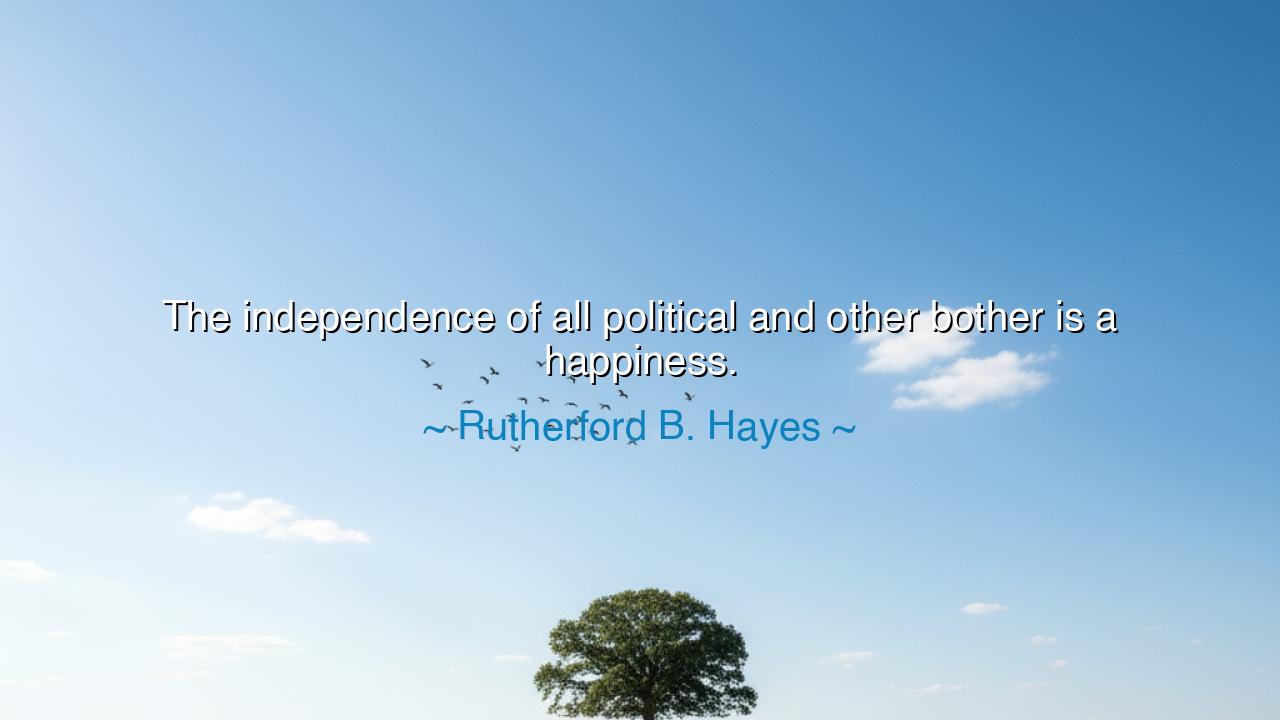
The independence of all political and other bother is a






In the quiet voice of reflection, Rutherford B. Hayes, the nineteenth president of the United States, once said: “The independence of all political and other bother is a happiness.” These words, though few, shine with the clarity of a man who had tasted both the sweetness and the burden of power. They are not the boast of a ruler, but the sigh of a sage — one who had walked through the noise of ambition, the storms of politics, and the endless demands of public life, and at last found peace in the freedom of the soul. In this humble phrase lies an ancient wisdom: that true happiness is not found in command or conflict, but in independence — in the liberation of the spirit from the turmoil of worldly concern.
To the ancients, independence was a form of inner mastery. The Stoics of Greece and Rome, such as Epictetus and Seneca, taught that a man is not free because he rules others, but because he rules himself. They believed that happiness comes not from power or recognition, but from serenity — from being untouched by the clamor of politics, wealth, or vanity. Hayes, though living centuries later, echoed this timeless truth. After years in office, surrounded by argument, compromise, and endless public duty, he understood what the philosophers meant: that the greatest reward of service is the moment when one can finally lay down the sword and return to stillness.
It is no small thing to rise above bother — the constant noise of opinion, the endless pull of duty, the ceaseless tide of expectation. For the world is filled with those who strive to influence and command, yet few who dare to seek peace. Rutherford B. Hayes, like Cincinnatus of Rome before him, found greater glory not in holding power, but in releasing it. Cincinnatus, when summoned to save Rome, took up the mantle of leadership, fought with valor, restored the state — and then, when the work was done, returned to his plow. He sought no wealth, no empire, only the quiet joy of independence. His example, like that of Hayes, shows that there is happiness not in the grasping, but in the letting go.
When Hayes speaks of freedom from “political and other bother,” he speaks also to the condition of the human heart. For though few of us rule nations, all of us are caught in the politics of life — the struggle for approval, the weariness of comparison, the endless striving for control. The lesson he offers is not only for the statesman, but for every soul burdened by the noise of the world. There comes a time when the heart must withdraw from the clamor and remember its own rhythm, when the spirit must say: “Enough.” In that moment of stillness, we rediscover the quiet joy that ambition cannot buy and chaos cannot destroy.
Consider the story of George Washington, who, after leading a revolution and serving as the first president, could have ruled for life — yet chose to retire to Mount Vernon. The world would have made him a king, but he longed instead for peace. He wrote that he wished to sit beneath his own vine and fig tree, “with none to make him afraid.” His independence from the thirst for power was his truest triumph. So too with Hayes, who after leaving office lived simply, devoting himself to education and justice, no longer bound by the storms of politics. Both men understood that happiness is not in the noise of the crowd, but in the quietness of conscience.
Independence, then, is more than freedom from others — it is freedom from oneself, from the restless ego that demands more, that fears stillness, that feeds upon the endless bother of life. To be independent in spirit is to be content with little, to live with calm in the face of turmoil, and to find joy not in mastery, but in simplicity. This is the wisdom of Hayes’s words: that happiness blooms not in the spotlight of fame, but in the calm shadow of humility.
Let this teaching be passed down: Seek your independence not in rebellion, but in serenity. Free yourself from the tyranny of comparison, the addiction to argument, and the hunger for control. Practice silence. Cultivate gratitude. Do not measure your worth by what the world shouts, but by the peace you carry in your heart. When you can stand apart from the noise and remain unshaken — when you can look upon the world’s chaos with compassion but without entanglement — then you will know the happiness that Rutherford B. Hayes found.
Thus, the teaching concludes: the true statesman, like the true sage, learns that the highest victory is not over others, but over the self. When all bother falls away, when one’s spirit stands free from ambition and unrest, there blooms a happiness deeper than triumph — the quiet joy of a soul at peace. This is the crown of wisdom: to serve when called, to let go when finished, and to live thereafter in tranquil independence.






AAdministratorAdministrator
Welcome, honored guests. Please leave a comment, we will respond soon